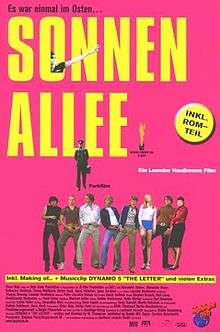Sonnenallee
| Sonnenallee | |
|---|---|
 | |
| Directed by | Leander Haußmann |
| Produced by | Claus Boje |
| Written by |
Thomas Brussig Detlev Buck Leander Haußmann |
| Starring |
Alexander Scheer Alexander Beyer Robert Stadlober |
Release dates |
|
Running time | 101 minutes |
| Language | German |
Sonnenallee (Sun Avenue or Sun Alley[1]) is a 1999 comedy film about life in East Berlin in the late 1970s. The movie was directed by Leander Haußmann. The film was released shortly before the corresponding novel, Am kürzeren Ende der Sonnenallee (At the Shorter End of Sonnenallee). Both the book and the screenplay were written by Thomas Brussig and while they are based on the same characters and setting, differ in storyline significantly. Both the movie and the book emphasize the importance of pop-art and in particular, pop music, for the youth of East Berlin. The Sonnenallee is an actual street in Berlin that was intersected by the border between East and West during the time of the Berlin Wall, although it bears little resemblance to the film set. Sonnenallee was broadcast in the Czech Republic under the title Eastie Boys.[2]
Cast
- Alexander Scheer – Michael Ehrenreich
- Alexander Beyer – Mario
- Robert Stadlober – Wuschel
- Teresa Weißbach – Miriam Sommer
- Katharina Thalbach – Doris Ehrenreich
- Henry Hübchen – Hotte Ehrenreich
- Elena Meißner – Sabrina
- Winfried Glatzeder makes a brief cameo appearance, reprising his role as Paul from the East German film The Legend of Paul and Paula.
Synopsis
Michael (or 'Micha') is a 17-year-old growing up in communist East Germany (GDR) in the 1970s. He spends his time with his friends listening to banned pop music, partying and trying to win over the heart of Miriam, who is dating a West Berlin boy. Over the course of the movie his best friend Mario, falls for an existentialist, gets kicked out of school and subsequently discovers he is going to be a father. The closing of the movie upsets Micha's thus far idealistic life, as Mario sells out his ideals by signing up for military service to support his girlfriend and the child. Furthermore, his young blonde friend, Wuschel, is shot by a GDR guard, but survives, thanks to The Rolling Stones double album Exile on Main St. in which the bullet has lodged. The young boy is devastated, however, prominently displaying the importance of pop music in their lives. Later, he gets a new copy by using the 50 West German mark that he gets from Miriam's ex-boyfriend when the latter causes him to crash his bike (accidentally). The film ends with a crowd of East Berliners advancing on the Berlin Wall entry/exit gate and singing "The Letter" by Dynamo 5, led by Michael and Wuschel, who jump down from the balcony they were perched and seemingly move through to the Western side.
Controversy
Writing for Der Spiegel, Marianne Wellshoff argued that the film glorified the GDR and played down the negative aspects of life in East Germany under Erich Honecker.[3] But other reviewers saw this criticism as unfair, and the film was well received by German viewers.[4][5]
References
- ↑ Sun Alley
- ↑ Eastie Boys
- ↑ Marianne Wellershoff, ""Sonnenallee": Musik der Freiheit" Der Spiegel, 4 October 1999: http://www.spiegel.de/kultur/kino/sonnenallee-musik-der-freiheit-a-45232.html
- ↑ Elke de Wit, "The Sunnier Side of East Germany" Central Europe Review: http://www.ce-review.org/00/9/kinoeye9_dewit.html
- ↑ Tim Cassidy, "Sonnenallee" CultureVulture: http://culturevulture.net/film/sonnenallee/